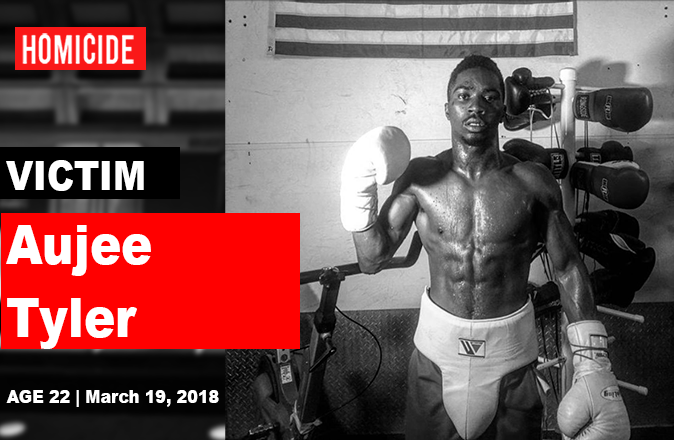
Thank you for reading D.C. Witness. Help us continue our mission into 2024.
Donate NowBy
Rebecca Connor [former]
- August 10, 2023
Court
|
Daily Stories
|
Homicides
|
Shooting
|
Suspects
|
Victims
|
On August 9, DC Superior Court Judge Michael Ryan sentenced Kaevon Sutton to four years and 11 months, suspending the entire sentence, and 8 months of supervised probation for a gun possession charge.
Sutton, 22, was charged with shooting and killing 22-year-old Aujee Tyler on March 19, 2018 on the 3500 block of Stanton Road, SE. On March 23, he was acquitted by a jury of first-degree murder while armed and possession of a firearm during a crime of violence. However, as part of the same verdict he was convicted of carrying a pistol without a license.
Parties discussed the outcome of Sutton’s trial during the August 9 hearing, with defense attorney Jessica Willis stating that even though the defense said Sutton acted in self-defense, they did not know if that led the jury to acquit Sutton of his most serious charges.
Leading up to the trial, which concluded in March, Sutton had first been confined at the Department of Youth Rehabilitation Services and then at the DC Jail for a total of roughly 4 years and 10 months. Willis said Sutton made the most of the services available to him, earning his high school diploma and dozens of other certificates.
Sutton’s defense team also argued that Judge Ryan should dismiss the carrying a pistol without a license charge, arguing that his acquittal on the more serious charges meant that he should no longer be tried as an adult.
Under Title 16, the US Attorney’s Office is able to charge 16- and 17-year-olds as adults if they commit certain offenses.
Defense lawyers for Sutton said since he was 16 at the time of the incident, had he only been charged with gun possession and not the two greater offenses, he could not be tried as an adult and since he was acquitted of those higher charges, should not be sentenced as an adult. The defense view is that “a child should not be saddled with an adult conviction” and that the legislation sending child defendants to adult courts was “unconstitutional.”
However, Judge Ryan denied the defense’s motion to dismiss, saying that there was little case law to support this position and he didn’t find “it that compelling an argument.”
Judge Ryan alluded to the difficult nature of the case given Tyler’s death and the partial acquittal. He stated that “the purpose has never been to right the wrong” in criminal sentencings, as no sentence could undo Tyler’s death.
Criminal sentences “should deal with the wrongs done to the community,” Judge Ryan said, adding that it is the job of civil courts to address private wrongs.
Both the prosecution and defense submitted documents with the prosecution seeking 36 months of supervised release, unsuspended, and the defense seeking 24 months of supervised release, suspending all but 30 days to allow the supervised release to go on Sutton’s record and make him eligible for the Youth Rehabilitation Act, which would make him eligible to have his conviction set aside in the future.
Both parties acknowledged the sentencing irony, as the maximum imprisonment time for a charge of carrying a pistol without a license is 36 months, which is almost two years less than the 4 years and 10 months Sutton was detained while awaiting trial.
The defense also argued that this long incarceration was punishment enough, with Willis stating that it was “a heart-wrenching tragedy” that Sutton lost 5 years to a jail cell.
Sutton was put on supervised release pending sentencing following his partial acquittal in March.
Judge Ryan said he did not believe either the prosecution or defense’s sentencing suggestions fully followed the law.
In order to impose a sentence he believed fair that followed the law, Judge Ryan sentenced Sutton to 4 years and 11 months, suspending all, crediting his pre-trial detention as time served. He also sentenced Sutton to 3 years of supervised release, suspending all supervised release as well, noting that three years is the recommended amount of supervised release for carrying a pistol without a license while also acknowledging that Sutton had already been detained over the maximum amount of detention time for such a charge.
Judge Ryan then sentenced Sutton to eight months of probation, which is the only time he is further required to serve. He also implemented the Youth Rehabilitation Act, allowing the possibility of setting aside his conviction in the future, if Sutton successfully completes his sentencing requirements.
In addition to serving the remaining eight months of probation, Sutton will also be required to register as a gun offender.
Follow this case